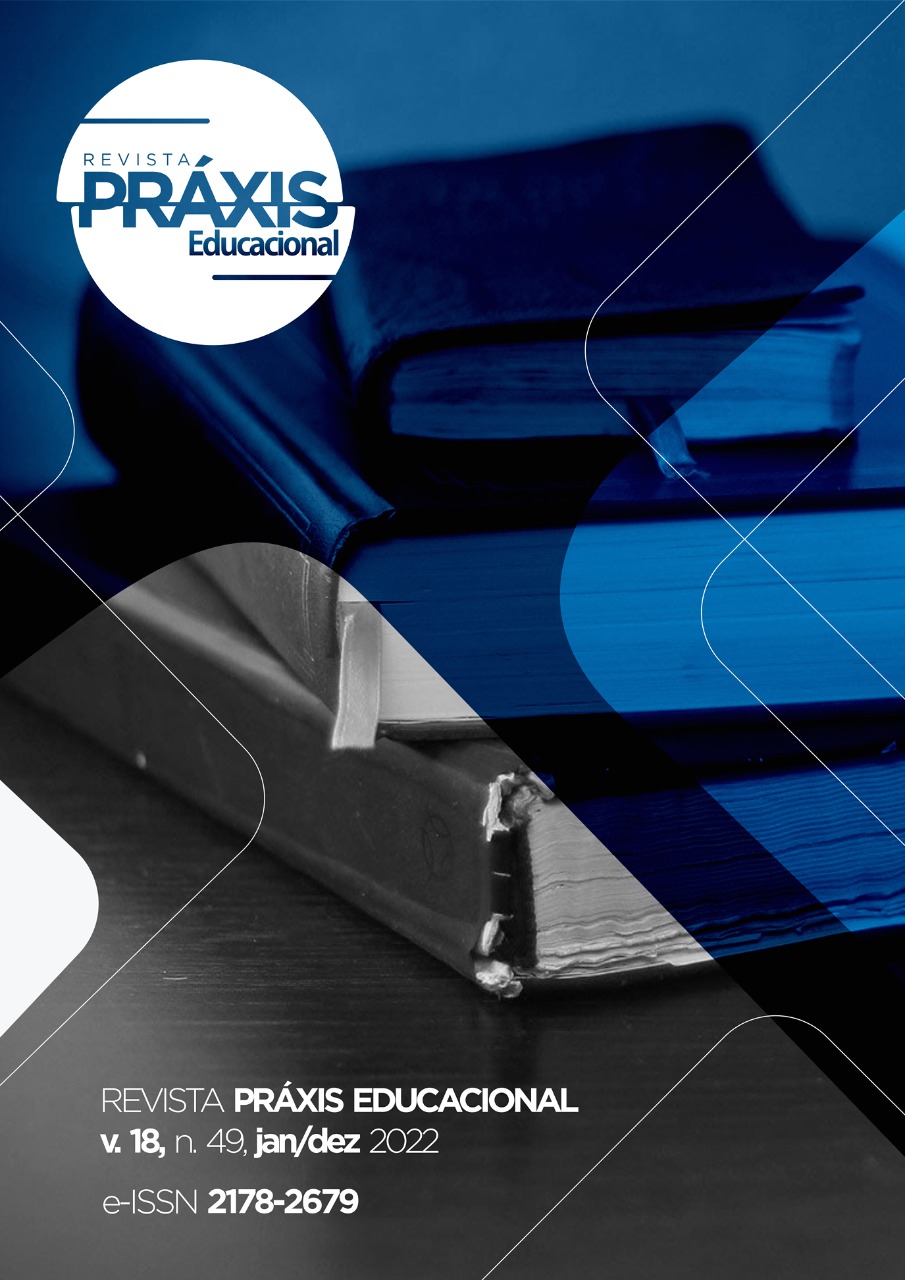Remote learning and the pandemic: a close-up
DOI:
https://doi.org/10.22481/praxisedu.v18i49.9121Keywords:
Production of subjectivity; Teachers inventive formation; HeterotopiaAbstract
This is an article woven by six hands, through meetings and conversations held between three teachers from the public education system, two from middle to high school and one from university. This texture conceptualizes an encounter as what activates a problematic field, the principle of an Teachers inventive formation. We put into analysis and into intervention a remote education, summoned by the pandemic scenarios of the present and its close-up plan, which eliminates the body in its totality as the enunciator. In the frame of a screen - computer and/or cell phone - education becomes the focus, evidencing a process of mass exclusion, both of the body and of a number of students and teachers who do not have access to the remote world. For this purpose, the work is divided into three close-up scenes, namely: Scene 1: Pandemic and pandemonium: will it pass!(?); Scene 2: other spaces and heterotopias: in a panting epidemic, a bit of air so as not to suffocate; Scene 3/Epilogue: gaps of an inventive teacher training: the evolution of freedom. The conceptual and methodological take proposed here presents shots that make up the scenes and that work as propagators of the critical dimension and the resistance to affirm self- managed and inventive ways of forming, that link knowing and living to an ethos - a policy for the making of free lives, rarities in times of remote education and control.
Downloads
Metrics
References
DELEUZE, G. A imagem-movimento. São Paulo: Brasiliense, 1990.
DELEUZE, Gilles. L'abécédaire Gilles Deleuze. Paris: Éditions Montparnasse, 1997. Videocassete. Sublinhado em português pelo MEC, TV Escola. Disponível em: https://drive.google.com/file/d/0B347KgD-3KhNcGdBemhqS3N0b1U/view
DELEUZE, Gilles. Conversações. Trad. Peter Pál Pelbart. Ed. 34: Rio de Janeiro. 1992.
DELEUZE, G; GUATTARI, F. Ano zero–rostidade. Mil platôs Capitalismo e Esquizofrenia, v. 3. Rio de Janeiro: editora 34, 1996.
DELEUZE, Gilles; GUATTARI, Felix. O que é a filosofia? São Paulo: Editora 34, 2004.
DELEUZE, Gilles; PARNET, Claire. Diálogos. São Paulo: Ed. Escuta, 1998.
DIAS, Rosimeri de Oliveira. Deslocamentos na formação de professores: aprendizagem de adultos, experiência e políticas cognitivas. Rio de Janeiro: Lamparina, 2011.
DIAS, Rosimeri de Oliveira. Formação inventiva de professores. Rio de Janeiro: Lamparina, 2012.
DIAS, Rosimeri de Oliveira. Pesquisa-Intervenção e formação inventiva de professores. Revista Polis e Psique. Vol 5, págs (193-209), 2015. Disponível em: file:///C:/Users/lsecr/Downloads/53949-238491-1-PB%20(1).pdf Acesso em: 6/7/2021.
DIAS, Rosimeri de Oliveira. formação inventiva de professores por entre tessituras ética, estética e política de escritas acadêmicas. In: Revista Childhood&Philosophy. Rio de Janeiro: UERJ, 2019. Disponível em: https://www.e-publicacoes.uerj.br/index.php/childhood/article/view/44236/31759
DIAS, Rosimeri de Oliveira; RODRIGUES, Heliana de Barros Conde. Escritas de si: escutas, cartas e formação inventiva de professores entre universidade e escola básica. Rio de Janeiro: Lamparina/FAPERJ, 2019.
DIAS, Rosimeri de Oliveira; RODRIGUES, Heliana de Barros Conde. Deslocamentos, invenção e formação outra - em companhia de Foucault. In: Revista Reflexão e Ação. Santa Cruz do Sul: UNISC, v. 28, número 3, 2020, p. 166-180. Disponível em file:///C:/Users/rosim/Downloads/14278-66032-3-PB.pdf Acesso em: 23 jun 2021. Acesso em: 01 jul 2021.
FOUCAULT, Michel. História da sexualidade 2: o uso dos prazeres. 7ª ed. Rio de Janeiro: Edições Graal, 1994.
FOUCAULT, Michel. A escrita de si. In: FOUCAULT, Michel. O que é um autor? Lisboa: Veja, 2002, p. 129-160.
FOUCAULT, Michel. A hermenêutica do sujeito. São Paulo: Martins Fontes, 2004.
FOUCAULT, Michel. O corpo utópico, as heterotopias. São Paulo: n-1 Edições, 2013.
FOUCAULT, Michel. Do governo dos vivos. São Paulo: Martins Fontes, 2014
KASTRUP, Virgínia. Aprendizagem, arte e invenção. Psicologia em Estudo, Maringá, v.6, n. 1, p. 17-27, jan./jun, 2001. Disponível em: https://www.scielo.br/j/pe/a/NTNFsBzXts5GHp4Zk8sBbyF/?lang=pt Acesso 01 jul 2021.
KRENAK, Ailton. Ideias para adiar o fim do mundo. São Paulo: Companhia das Letras, 2019.
ROLNIK, Suely. Cartografia Sentimental: transformações contemporâneas do desejo. Porto Alegre: Sulina, 2007.
SECRON, Liliana. Salas de leitura e suas heterotopias como dispositivo para uma formação inventiva de professores. 2020. Dissertação (Mestrado em Educação). Rio de Janeiro: Faculdade de Formação de Professores da Universidade do Estado do Rio de Janeiro – FFP-UERJ, Programa de Pós-graduação em Educação - Processos Formativos e Desigualdades Sociais. Disponível em: https://drive.google.com/file/d/1aVw5pr6cehjYlskyXhb9lUEL-hZpiPZJ/view Acesso em: 1/5/2021.
PASSOS, Eduardo; KASTRUP, Virgínia; ESCOSSIA, Liliana. Pistas do método da cartografia: pesquisa-intervenção e produção de subjetividade. Porto Alegre: Sulina, 2009.
TRINDADE, Rafael. Taz – por que zona?. jun 2020. Disponível em: https://razaoinadequada.com/2018/06/20/taz-por-que-zona/
Downloads
Published
How to Cite
Issue
Section
License
Copyright (c) 2022 Práxis Educacional

This work is licensed under a Creative Commons Attribution-ShareAlike 4.0 International License.
You are free to:
Share - copy and redistribute the material in any medium or format; Adapt - remix, transform, and build from the material for any purpose, even commercially. This license is acceptable for Free Cultural Works. The licensor cannot revoke these freedoms as long as you follow the terms of the license.
Under the following terms:
Attribution - You must appropriately give credit, provide a link to the license, and indicate if any changes have been made. You may do so in any reasonable way, but not in a way that suggests that you or your use is endorsed by the licensor.
There are no additional restrictions - You cannot apply legal terms or technological measures that legally restrict others to make any use permitted by the license.










